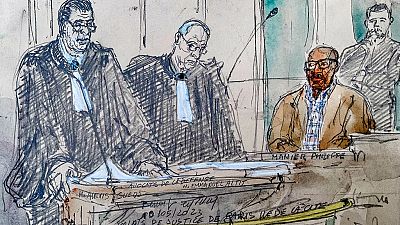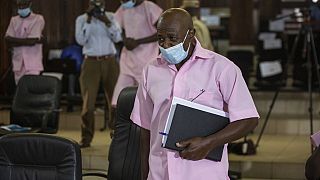France
The former Rwandan gendarme, Philippe Hategekimana, 66, naturalized French under the name of Philippe Manier, sentenced to life imprisonment for genocide and crimes against humanity in Rwanda will appeal his conviction, we have learned Tuesday from his lawyers.
"Philippe Manier is convinced that the trial will, after a fair process, establish his innocence," said Mes Emmanuel Altit and Alexis Guedj, his lawyers in a press release.
"It's frankly unbearable, it's hopeless ," reacted the president of the Committee of Civil Parties for Rwanda (CPCR), Alain Gauthier, contacted by AFP. "We would have to justify these calls" , he said, recalling that, of the five trials of alleged Rwandan genocidaires which took place in France_, "three calls are now in progress"_. Only two convictions are final.
The former chief warrant officer was tried for crimes committed during the genocide in Rwanda which killed more than 800,000 people according to the UN, mainly Tutsi exterminated between April and July 1994.
He was tried in Paris under the "universal jurisdiction" exercised, under certain conditions, by France to judge the most serious crimes committed outside its soil.
The Paris Assize Court sentenced him to life imprisonment, the heaviest sentence provided by law, on June 28, after a seven-week trial, finding him guilty of “virtually all counts ” that weighed against him.
"The court considered that you committed the most serious acts, those of mass crimes, that you were a zealous agent in the plan to exterminate the Tutsi", said the president of the assize court, Jean -Marc Lavergne , announcing the verdict.
Nicknamed "Biguma" at the material time, he was accused of having participated in or encouraged the murder of dozens of Tutsi in April 1994 in the prefecture of Butare (southern Rwanda), including the burgomaster of Ntyazo who resisted the implementation of the genocide in his commune.
For the prosecution, he had notably ordered and supervised the erection of several "barriers", roadblocks, "intended to control and assassinate Tutsi civilians".
The prosecution also accused Mr Manier of having participated, by giving orders, even by being directly involved on the ground, in three massacres: that of Nyabubare hill, where 300 people were killed on April 23, 1994, that, four days later, of the hill of Nyamure where thousands of Tutsi had taken refuge, and that of the Institute of Agronomic Sciences of Rwanda, where tens of thousands of victims were counted.
"I sincerely sympathize with the suffering endured by the victims. The genocide against the Tutsi is a reality. And I witnessed it. But I have nothing to reproach myself with," said the audience. former gendarme during one of his rare interventions.
His defense, which had pleaded acquittal, wanted the doubt to benefit the accused by considering that the accusation was "built on sand".
His lawyers had questioned the testimony for the prosecution, the most damning for the accused, of prisoners questioned by videoconference from their prison in Kigali.














02:05
Human Rights Watch urges action over incendiary weapons use in South Sudan
01:02
Sudan accuses UAE of contributing to genocide
Go to video
United Nations marks anniversary of genocide in Rwanda
Go to video
Rwanda commemorates the 1994 genocide that claimed at least 800,000 lives
02:26
Mixed feelings in Goma ahead of DR Congo's talks with M23 rebels
Go to video
Rwandan government announces death of deputy spokesperson Alain Mukuralinda